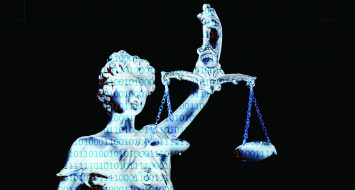Email Wire Fraud Scam Affecting Lawyers and Law Firms
March 17, 2022
Reading time: 3 minutes

Scammers are increasingly targeting lawyers by sending forged emails to law firms, their clients and/ or to financial institutions, instructing that funds be wired to accounts controlled by the scammers. The scam typically involves a compromised email account (which can be the lawyer’s, the client’s or even the bank’s) which scammers are monitoring to uncover pending transactions requiring an outlay of funds – such as a real estate purchase, a loan, or the settlement of a lawsuit. At the appropriate time when the parties are expecting a request for funds, the hackers (who often know exactly how much money is being transferred) will send wire instructions to the party holding the funds requiring that the funds be sent to the hackers’ account. The funds are immediately swept from the account, and the hackers disappear. The emails usually originate from an address that appears to be from a legitimate sender, but uses a similar, but slightly altered domain name. Sometimes the scammer will request a change to previous wire transfer instructions after a request has already been made (such as requiring a change in account numbers), or suddenly require that funds be transferred by wire when the original agreement was to pay by check.
For example, in a recent scam, hackers penetrated a law firm’s email accounts and monitored a lawyer’s account who was involved in settlement negotiations of a large commercial case. After the lawyer accepted a settlement on behalf of the client, but before the settlement agreement was signed, hackers, using an altered email account, sent an email to the lawyer’s client requesting that the client send the funds for settlement by wire transfer to the lawyer’s “trust account” in anticipation of the finalization of the settlement. The client followed the instructions, and the money disappeared. In another case, a lawyer received wire transfer instructions on a settlement for an amount lower than had been previously discussed, with a deadline by end of day. The lawyer was surprised at the lower demand, and called the opposing counsel to determine if the transfer of funds could wait until the following day. Needless to say, she discovered that no lower demand had been made, and opposing counsel had not sent the email at all. In another situation, on the day before the closing of a real estate transaction was scheduled, a client was sent a forged email which appeared to be from his lawyer instructing him to wire the funds needed for closing to the lawyer’s account. At closing, the parties discovered that the funds were missing, and no one involved in the closing had sent the email.
To avoid being a victim to one of these scams, attorneys should exercise a healthy dose of skepticism before any money is wired for a transaction. Look for inconsistencies with email such as various email addresses in use and different spellings of a name. Be wary when a party in a transaction suddenly changes their normal procedures, including instructions to wire money to a different account, using a personal email address as opposed to their usual work email, or contacting a different person at the company. All of these could be red flags to a potential scam. To confirm a proposed change, an attorney should first call the intended recipient to verify that the information is accurate and legitimate before transferring any funds. Additionally, lawyers should instruct clients and others that email instructions regarding wire transfers should always be viewed skeptically, and that confirmation by phone is an absolute must.
In fact, to the extent that wire transfers can be avoided altogether, lawyers should probably do so. While the UCC protects the sender of a stolen check with a forged endorsement, no such protection is afforded to funds wired to the wrong account. Sending money the old fashioned way through snail mail or by hand delivery may be slower and more cumbersome, but in today’s present climate, it’s far less likely to result in stolen funds.
Additional Technology content

Hey Alexa – When Can I Draft Documents With AI?
No attorney can be fully insulated from a legal malpractice claim or grievance, but there are certain precautions that can be taken to minimize exposure to such claims. One important risk management tool is the strict screening of all cases before they are accepted into the practice. Rejecting cases with certain “red flags” can go a long way in preventing otherwise avoidable malpractice claims and grievances. Here are eight important questions to ask before accepting any new case.

What can lawyers gAIn from artificial intelligence?
So, how do you craft a meaningful billing entry that gets you paid and protects against future claims? It is as easy as 1-2-3.

iLawyer: the Ethical Use of Technology in Your Practice
A lawyer’s duty to provide competent representation now includes an ethical obligation with respect to technology. In 2012, the ABA added Comment 8 to Rule 1.1 of its Model Rules requiring lawyers to stay current with relevant technology.
Information provided by AttPro Ally is not intended as legal advice. This publication provides best practices for use in connection with general circumstances and ordinarily does not address specific situations. Specific situations should be discussed with legal counsel licensed in the appropriate jurisdiction. By publishing practice and risk prevention tips, Attorney Protective neither implies nor provides any guarantee that claims can be prevented by the use of the suggested practices. Though the contents of AttPro Ally have been carefully researched, Attorney Protective makes no warranty as to its accuracy, applicability, or timeliness. Anyone wishing to reproduce any part of the AttPro Ally content must request permission from Attorney Protective by calling 877-728-8776 or sending an email to [email protected].
© 2026 AttPro Ally. All rights reserved.